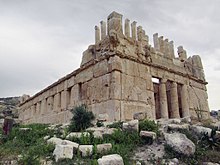Hyrcanus (Tobiade)

Hyrcanus was a member of the Tobiad family who actually ruled Judea at the time of Ptolemy IV .
Flavius Josephus processed a Tobiad novel in his work Jewish antiquities . It says that the prostates and general tax farmer Joseph Hyrcanus, his youngest son, sent to Egypt to offer congratulations on the birth of the heir to the throne. This is probably the later Ptolemy V Epiphanes, who lived around 210 BC. Was born in BC. Hyrcanus won the favor of King Ptolemy IV with rich gifts. According to Peter Schäfer , Hyrcanus thus bought the office of prostasia (= political representation of the people vis-à-vis the king). His brothers, who had suspected something like this, wanted to have him killed in Alexandria . It is true that Hyrcanus defended himself and returned to Jerusalem. But he could not take office and withdrew to his family estate on the other side of the Jordan . He stayed there as part of the Ptolemies, even when Jerusalem fell to the Seleucids and the rest of the family had reoriented themselves politically accordingly. Under Antiochus IV , his rule in the East Bank collapsed.
In 2 Makk 3,10–11 EU it says that the high priest Onias III. kept possessions of Hyrcanus in the Jerusalem temple . The part of the Tobiad family that had passed over to the Seleucids rivaled Onias for power in Jerusalem; therefore Schäfer suspects that Onias shared Hyrcanus' political sympathies for the Ptolemies. However, the progress of the report is legendary and does not allow any conclusions to be drawn as to how the conflict ended.
Josephus reported from a possibly Seleucid source that the Jerusalem Tobiads succeeded in overthrowing the high priestly family of the Oniads. As a result, Menelaus, a high priest who was not of Zadokid descent, was appointed. The fallen oniad Jason fled to the East Bank, probably to Hyrkanos, who resided there.
When Antiochus IV threatened him as a Ptolemaic partisan, Hyrcanus committed suicide.
literature
- Peter Schäfer: History of the Jews in antiquity. The Jews of Palestine from Alexander the Great to the Arab conquest . 2nd Edition. Mohr Siebeck, Tübingen 2010, ISBN 978-3-16-150218-7 .
- Klaus Bringmann : History of the Jews in Antiquity. From the Babylonian exile to the Arab conquest. Klett-Cotta, Stuttgart 2005, ISBN 3-608-94138-X .
Individual evidence
- ↑ Peter Schäfer: History of the Jews in antiquity , Tübingen 2010, p. 24.
- ↑ Peter Schäfer: History of the Jews in antiquity , Tübingen 2010, p. 28 f .; Klaus Bringmann: History of the Jews in Antiquity. From Babylonian exile to the Arab conquest , Stuttgart 2005, p. 97.
- ^ Peter Schäfer: History of the Jews in antiquity , Tübingen 2010, p. 41.
- ↑ Peter Schäfer: History of the Jews in antiquity , Tübingen 2010, p. 46.
- ↑ Klaus Bringmann: History of the Jews in antiquity. From Babylonian exile to the Arab conquest , Stuttgart 2005, p. 118.
| personal data | |
|---|---|
| SURNAME | Hyrcanus |
| BRIEF DESCRIPTION | Member of the Tobiaden family |
| DATE OF BIRTH | 3rd century BC Chr. |
| DATE OF DEATH | 3rd century BC BC or 2nd century BC Chr. |